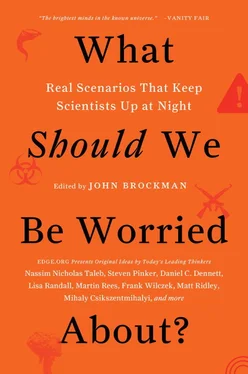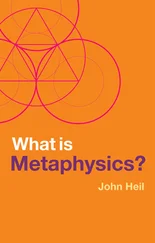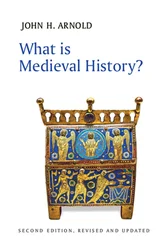One can say that the “worried” can be thought of as a means of focusing upon a particular problem. But the very act of picking one problem out of the many available constructs the trap into which we all fall the minute we begin thinking about the world. We should in fact be “worried” not just about a single selected problem but about all possible problems.
But most important: What does “worried” mean, other than the inevitable fall into human consciousness that focuses the mind—producing inevitably science, politics, and everything else in the world as we know it. There seems no responsible alternative; indeed, it is the only historical alternative to the disreputable “blissed out” state of passivity and removal from the real world, as known to us through our rigorously conditioned mechanisms.
Perhaps—but perhaps not. I reference not only suppressed mystical traditions—plus more acceptable philosophers, such as Heidegger and phenomenologically oriented contemporaries—but first and foremost my early collegiate inspiration in art theory, Anton Ehrenzweig’s great books The Hidden Order of Art and The Psychoanalysis of Artistic Vision and Hearing. Ehrenzweig demonstrates how artists in many disciplines, from many different historical periods, operate not out of normal focused vision but out of wide-angle unfocused perception—and thereafter soon discovered similar theses, hidden or not, in other “official” Western thought. But how does theory relate to real-world problems of the sort we should now be worried about? Well, de-focusing on obsessive worrisome problems often leads to the sudden emergence of a solution where previous directed effort had often failed. (Eureka!—Poincaré, etc.)
So what should we be worried about? Perhaps the failure to stop worrying, when stopping can (all by itself, after the proper preparing of the ground with concentration and “worry”) lead to sudden vision.
It’s tricky, yes. And difficult. And sometimes a frightening risk—giving up everything we “know” when it’s “knowing” that gives rise to the uncontrollable virus of worrying. But I suggest that this year’s question is a hidden trick. That was not the intention, I feel sure, but I do see it as a trick question for all half-brilliant, half-sleeping human consciousness.
WORRYING—THE MODERN PASSION
JAMES J. O’DONNELL
Classical scholar, University Professor, Georgetown University; author, The Ruin of the Roman Empire
Worrying is a worry. Identifying a serious problem and taking rational action to analyze and mitigate it: excellent behavior. Identifying a serious problem, taking what steps you can to mitigate it, and recognizing that you can’t do more: excellent behavior.
But worrying about things is a modern passion. To worry properly, you should worry in groups, large groups; you should identify something that could happen but doesn’t have to; you should forget to read Daniel Kahneman’s Thinking, Fast and Slow; and you should proceed to dwell on the topic, seeking to promote anxiety for yourself and especially for others; you should be very sure not to engage in rational (especially quantitative) analysis or heed the work of those who do; and you should abstain from all action that might make the problem go away.
Your anxiety will in the end go away, because the problem will most likely go away; or perhaps your fear will come true and you’ll be in a different place; or else you’ll be dead. You will have maximized your unhappiness and stress levels and, with luck, those of others, with nothing to show for it otherwise.
The ancients knew this behavior, of course, and the Greeks called it deisidaemonia and the Latins superstitio . They used those words to bracket behavior that led to no good. We’ve borrowed the latter word but applied it narrowly, to activities where anxiety cringes before the imagined divine. The ancients didn’t need a broader category, because the ubiquitous divine could be blamed for anything. We haven’t got a better word yet to describe and deplore generalized cringing before what our own imaginations show us. We could use one. In the meantime, a broad awareness of the cultures and deeds of people and nations in our time, and all the times before that we know of, can be an excellent remedy for worry and an instigation to rational behavior.
There are a lot of other essays on this typically intriguing Edge Question that invoke worry and use the word easily—so should we be worried about that? Here’s the test I would use to decide: If what my colleagues in these pages are talking about is evidence-based, especially quantitative, peer-reviewed or peer-reviewable, and has the effect of increasing our understanding and moving people toward appreciation of intelligent actions we can take as individuals or society, I’m not going to call that “worry.” And there is a lot of it.
But if it’s about the Comet ISON veering off its path and plunging to Earth and there’s nothing we can do about it—that’s a worry we should worry about.
ROBERT PROVINE
Psychologist & neuroscientist, University of Maryland; author, Curious Behavior: Yawning, Laughing, Hiccupping, and Beyond
Worry is a kind of thought and memory evolved to give life direction and protect us from danger. Without its nagging whispers, we would be prone to a reckless Panglossian lifestyle marked by drug abuse, unemployment, and bankruptcy. Why not smoke, have that last drink for the road, pollute the water supply, or evade taxes? All will be fine! In our feel-good, smiley-face era, generally free of plague, famine, and war, it’s easy to adopt a smug optimism and demean a behavior that has served us well throughout our evolutionary history.
In the popular media, we are constantly reminded of the presumed personal and social benefits of chirpy unbridled optimism and are taught to fear the corrosive effects of pessimism and worry. I speak from experience. As an expert on laughter and humor, I am frequently contacted by reporters seeking quotes for stories they have been commissioned to write about “laughing your way to health,” “the power of a positive outlook,” and the like. They are uninterested when I report that laughter, like speech, evolved to change the behavior of other people, not to make us healthy, and that any medicinal effects of laughter are secondary. Also unwelcome are my comments about the dark side of laughter in jeers, ridicule, and violence. In the interest of restoring balance, I accept the role of curmudgeon and defend the value of worry.
On the basis of a famous long-running longitudinal study of 1,178 high-IQ boys and girls initiated by Lewis Terman in 1921, Howard Friedman and colleagues found that conscientiousness was the personality trait that best predicted longevity. Contrary to expectation, cheerfulness (optimism and sense of humor) was inversely related to longevity. In other words, conscientiousness, a correlate of worry, pays off in a long life. A modest level of worry is usually best, an instance of the U-shaped function familiar in physiological and behavioral science. Too much worry strands us in an agitated state of despair, anxiety, and paranoia; too little leaves us without motivation and direction. Worry contributes life’s to-do list, but its relentless prompts are unpleasant, and we work to diminish them by crossing items off the list. The list is constantly fine-tuned and updated. As life’s problems are solved, topics of worry are extinguished, or if a dreaded event does not occur or becomes obsolete, we substitute new, more adaptive topics of concern. The bottom line? Stop worrying about worry. It’s good for you.
Читать дальше












